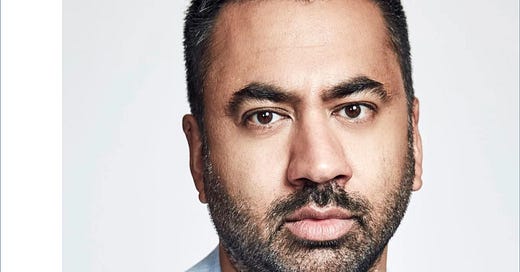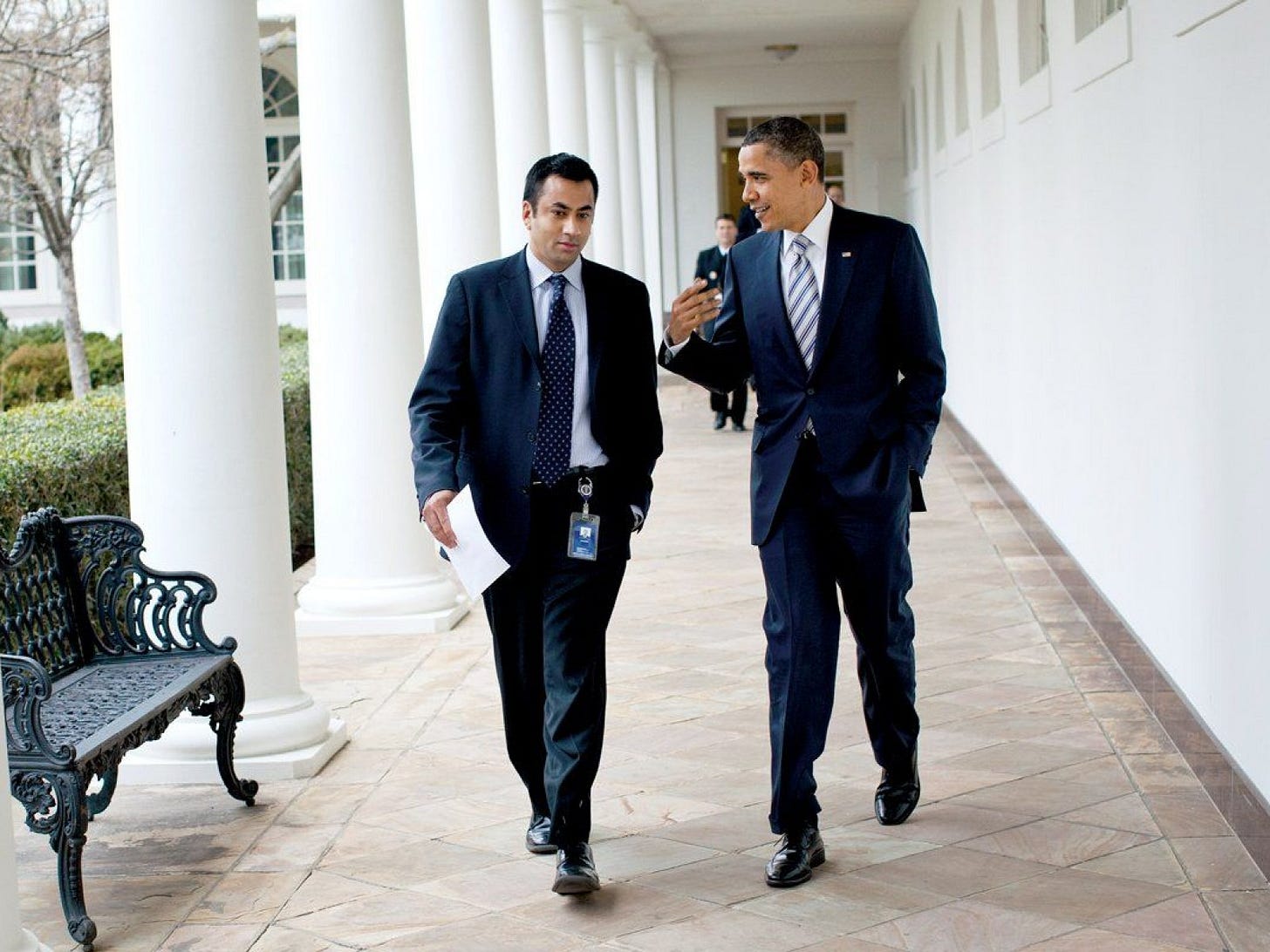#41 Kal Penn, Actor 🎭, Author, Former White House Staffer
On his journey through acting, public service, and what's next
Welcome back trailblazers! I’m Simi Shah, and every other week, I dive deep into the journey of a trailblazing South Asian leader. Remember to find us on Instagram, LinkedIn, Apple, and Spotify!
Season 5 Kickoff 🚀 Kal Penn, Actor
To kick off Season 5 🥳, I catch up with Kal Penn, Actor, Author, and former White House Staffer.
Kal jumpstarted his acting career in the early 2000s with performances in The Namesake and Harold & Kumar franchise. He has also starred in a host of other fan favorites: Designated Survivor, House, and How I Met Your Mother to name a few.
In 2009, Kalpen made a left turn out of acting and into the Obama Administration where he served as the Principal Associate Director in the White House Office of Public Engagement. He eventually co-chaired President Obama’s re-election campaign and also served on the President’s Committee on the Arts and Humanities. Before becoming a professional actor, Kal studied film and sociology at UCLA.
Today, he continues to build his robust repertoire in Hollywood, with a forthcoming show about climate change, Getting Warmer with Kal Penn, a biopic about famed Raptors Superfan, Nav Bhatia, and several other projects. Last year, Kal released You Can’t Be Serious which recounts his phenomenal journey and where he first publicly revealed he was gay and engaged to be married to his partner of 11 years. Kal paved the path for much of the representation we see on screen today, which is why I was all the more excited to dig into his story. Read on for excerpts:
P.S. Do you like our pod? It would mean a lot to us if you’d write us a review!
Early on, you were often typecast — made to play roles that captured the prejudices of the era, e.g. terrorists or the geek with the Indian accent. On one hand, you’re a person of color trying to break into this industry, but you’re trying to hold your ground as a serious, multi-dimensional actor. How did you grapple with the “Brown catch-22?”
I call it the “Brown Catch-22” in my book. Look, it’s hard for any actor to get a job. It’s a super competitive industry. Any time you’re starting out, no matter what you look like, casting directors are going to try to hire you for jobs that reflect what they think you should play. The challenge with that is there weren’t a whole lot of jobs for people who looked like me in the late 90s, early 2000s. At that time, the only time you can audition for anything is when something is written specifically ethnic or specifically Indian. That tended to also be very stereotypical.
I love that this is a South Asian platform because you’ll understand without me having to explain a whole lot. I think we look at a stereotype and the first reaction people have is: “Oh, man. He had to do an accent. He had to play a cab driver.” That’s always been weird to me because it’s almost as if having an accent or being a cab driver are somehow not good things. Those guys work so hard. Plenty of people have accents — accents alone do not make a stereotype.
An accent is used to mask bad writing or subpar writing. A profession is the focus of what a character is, as opposed to who he is and what advances the plot of the piece. A lot of the more stereotypical representations happen to come from this reductionism of Asians. It was frustrating at first. Sure, it might be contributing to a stereotype, but you might also need to take a particular job to get a credit on your resume. It was always a calculation. Do I need the money to pay my rent? Will I even get this job? If I auditioned for it, will it yield something bigger? Will it lead to another job? There are plenty of actors who rejected this calculus. I completely respect that path as well.
In my case, I decided to not go 100%. It’s tough now, especially when roles like Van Wilder with Ryan Reynolds have their 20th anniversary. You can obviously point and go — wasn’t that a stereotype? Yes, it was. I’m happy to share the story about how those projects came about. But, you’ll never know the other ones that I and other Brown actors said: “No, I’m good. I don’t want to audition for that thing.”
You don’t go to medical school and say, ‘I’m going to be the best Indian doctor I can be.’ You go to medical school because presumably you have a passion for medicine. I have a passion for storytelling in the arts. I’m didn’t go to Indian drama school. I’m just went to drama school. I didn’t want to have to worry about navigating things like representation, race, or ethnicity. You so badly want to have this luxury that other performers have. But we don’t live in a vacuum. I was certainly mindful of the fact that I didn’t see a whole lot of characters who looked like me on screen, but a lot of those early years were navigating these kinds of conversations.
You wrote your recent memoir You Can’t Be Serious partially because you wanted to show people that you can have multiple passions in a world that often makes us feel like you can only have one. In 2009, you left your role as a series regular on House to join the Obama White House. Can you talk about your passion for politics and this decision?
I was working on the T.V. show House at the time. It was the first regular acting job I had. Actors worked for a couple of weeks, couple of months, or sporadically, unless you’re on a series which meant every single day. I got to go to work and wasn’t expecting to leave that show for any reason. I always had an interest in public service but not politics.
Olivia Wilde, who was on the show with me, had a plus one to a Barack Obama campaign event in October 2007. He was down 30 points in the primary polls against Hillary Clinton and John Edwards. Nobody thought he was going to win the Democratic nomination, not to mention become the President-Elect. I decided to go with Olivia mostly because it was a free open bar, but it motivated me to volunteer for the campaign.
I got hooked. I loved the people I met on the campaign. Fast forward about a year and a half, I had gone to 26 different states as a campaign volunteer and working on the Arts Policy Committee for the Obama campaign. Then he’s elected and there’s an opportunity to serve at the White House. The story is a lot more juicy than that. It involves Michelle Obama hazing me at an Inauguration concert backstage with my parents. That’s the real reason that I got the job to begin with.
It’s a bunch of steps that led to having the chance to serve our country at the White House. The thing about public service that really stuck with me was as an actor, I got a lot of attention when I worked on the campaign. I was already in the public eye, so to speak. But there are thousands of people who take leaves of absence from their private sector jobs to work in public service and in government all the time, regardless of their political affiliation or which administration they’re serving. It’s just at the federal level — they’re on school boards, city councils, local PTAs. That was really inspiring to see.
Season 5 is in full swing — catch the full episode on Apple or our website!
Interview curated with the help of Trailblazers Fellow, Nikki Zinzuwadia.





